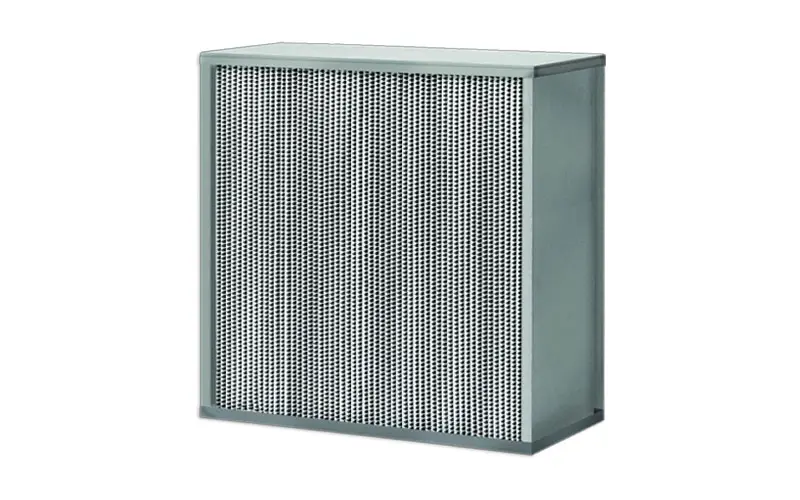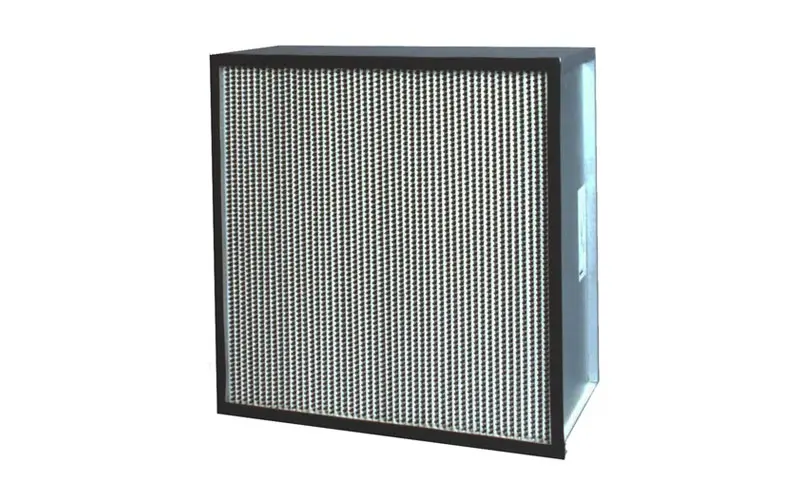
HEPA FILTERS
HEPA filters are trusted across a wide range of industries. Whether you're outfitting a cleanroom, healthcare facility, or commercial HVAC system, these high-performance filters help reduce airborne contaminants and improve overall air quality in critical spaces where cleanliness and compliance are non-negotiable.

Aerostar A-Series HEPA Filter
Filtration Group

Camfil Absolute VG Filter
Camfil

Camfil Absolute XH Filter
Camfil

Camfil Absolute XS Filter
Camfil

Camfil Filtra 2000
Camfil

Viskon-Aire Supercel V Max
Viskon-Aire
Can’t find what you’re looking for? Not sure which filter is the right fit? Let us help you find exactly what you need.
Choosing the Right HEPA Filter
HEPA (High-Efficiency Particulate Air) filters are designed to capture at least 99.97% of airborne particles down to 0.3 microns — including fine dust, pollen, mold spores, bacteria, and some viruses. They’re the gold standard for clean air in sensitive environments where even tiny contaminants can create big problems.
While any true HEPA filter meets a minimum efficiency threshold, performance can vary widely depending on airflow resistance, media construction, and rated capacity. Some are individually tested and certified for critical applications, while others are better suited for less demanding environments.
| Pros |
|---|
| Captures 99.97% of particles ≥0.3 microns |
| Improves indoor air quality dramatically |
| Ideal for sensitive environments like hospitals |
| Long lifespan in clean environments |
| Individually tested for guaranteed performance |
| Cons |
|---|
| Higher upfront cost than standard filters |
| Can restrict airflow if not sized correctly |
| Does not remove gases or odors |
| Requires professional installation for best results |
| Must be replaced regularly to maintain efficiency |
Before you choose a HEPA filter for HVAC use, it’s important to consider how it will interact with your system. A filter that restricts too much airflow can reduce efficiency or overwork your fans, while an undersized filter may not deliver the level of protection your space requires.
Beyond efficiency, look at specs like CFM capacity, filter depth, media type, and frame material to ensure compatibility with your system and maintenance plan.
Selecting the right HEPA filter isn’t just about going with the highest rating — it’s about finding the right balance between air quality, airflow, and application-specific needs. If you’re unsure what fits your system best, we’re here to help you make a confident, informed choice.
HEPA Filter Applications
Hospitals
Cleanrooms
Manufacturing
Food Processing
HEPA filters are vital in healthcare settings, protecting patients and staff by removing airborne contaminants, bacteria, and viruses. They're commonly used in isolation rooms, surgical suites, and clean corridors to help maintain sterile, safe indoor air environments.
Cleanrooms require strict particulate control, and HEPA filters are the frontline defense. Used in pharmaceutical, biotech, and semiconductor environments, these filters help meet ISO and GMP standards by trapping microscopic particles that can compromise product integrity.
From electronics to aerospace, many manufacturing processes depend on clean air to prevent defects and ensure worker safety. HEPA filters for HVAC systems remove fine dust, fumes, and other airborne contaminants that can damage equipment or impact product quality.
In food and beverage production, air quality directly impacts hygiene and shelf life. HEPA filters help control airborne contaminants, mold spores, and dust in packaging areas and clean zones, supporting regulatory compliance and product purity.
Frequently Asked Questions
HEPA, or High-Efficiency Particulate Air, filters capture 99.97% of airborne particles down to 0.3 microns. This includes dust, pollen, mold spores, pet dander, bacteria, smoke, and even some viruses. They’re ideal for creating safer, healthier indoor environments across many industries.
Yes, because HEPA filters are denser and more efficient than standard filters, they can cause some airflow resistance if not properly sized or installed. Selecting the right filter size and ensuring your HVAC system can handle the airflow demands helps maintain system performance without sacrificing air quality.
Authentic HEPA filters undergo rigorous testing to ensure they meet strict standards, capturing 99.97% of particles at 0.3 microns. Certified filters typically come with documentation or labeling verifying performance. Confirming these certifications is important to guarantee your filter delivers the expected level of air purification.
Yes, and we’d be happy to. Choosing the right HEPA filter can feel overwhelming, but you don’t have to figure it out alone. Our filtration experts will walk you through every step of the process and help you find the best fit for your system, application, and air quality goals. Just contact us with your equipment details, and we’ll take it from there.
HEPA filters generally need replacement every 6 to 12 months, but this varies based on factors like system use, air quality, and environmental contaminants. Facilities with higher dust or pollutant levels may require more frequent changes to maintain peak filtration and airflow efficiency.